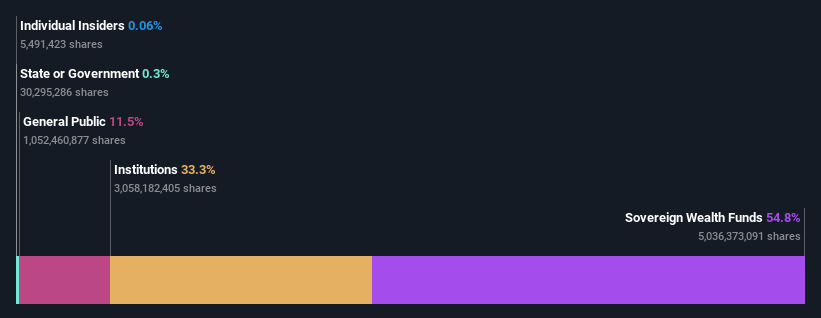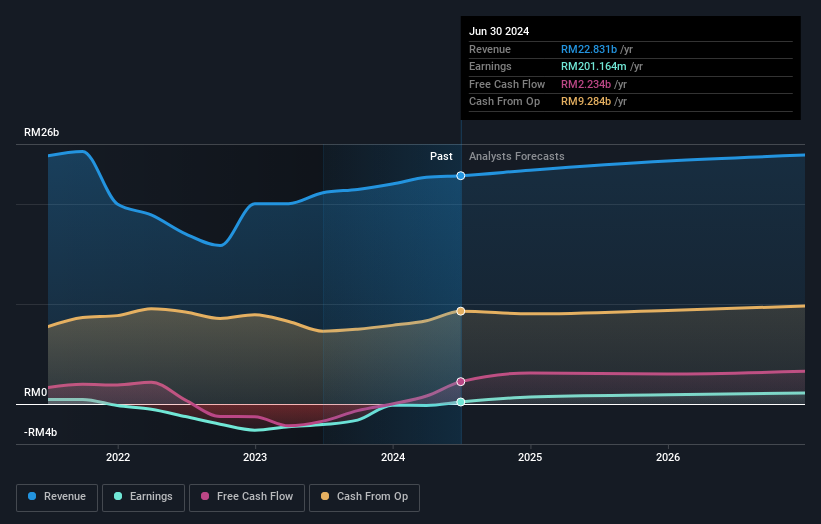While institutions own 33% of Axiata Group Berhad (KLSE:AXIATA), sovereign wealth funds are its largest shareholders with 55% ownership
Key Insights
- The considerable ownership by sovereign wealth funds in Axiata Group Berhad indicates that they collectively have a greater say in management and business strategy
- A total of 2 investors have a majority stake in the company with 55% ownership
- Institutions own 33% of Axiata Group Berhad
If you want to know who really controls Axiata Group Berhad (KLSE:AXIATA), then you'll have to look at the makeup of its share registry. We can see that sovereign wealth funds own the lion's share in the company with 55% ownership. That is, the group stands to benefit the most if the stock rises (or lose the most if there is a downturn).
And institutions on the other hand have a 33% ownership in the company. Insiders often own a large chunk of younger, smaller, companies while huge companies tend to have institutions as shareholders.
Let's take a closer look to see what the different types of shareholders can tell us about Axiata Group Berhad.
Check out our latest analysis for Axiata Group Berhad

What Does The Institutional Ownership Tell Us About Axiata Group Berhad?
Institutional investors commonly compare their own returns to the returns of a commonly followed index. So they generally do consider buying larger companies that are included in the relevant benchmark index.
We can see that Axiata Group Berhad does have institutional investors; and they hold a good portion of the company's stock. This can indicate that the company has a certain degree of credibility in the investment community. However, it is best to be wary of relying on the supposed validation that comes with institutional investors. They too, get it wrong sometimes. If multiple institutions change their view on a stock at the same time, you could see the share price drop fast. It's therefore worth looking at Axiata Group Berhad's earnings history below. Of course, the future is what really matters.

We note that hedge funds don't have a meaningful investment in Axiata Group Berhad. Looking at our data, we can see that the largest shareholder is Khazanah Nasional Berhad with 37% of shares outstanding. The second and third largest shareholders are Permodalan Nasional Berhad and Employees Provident Fund of Malaysia, with an equal amount of shares to their name at 18%.
After doing some more digging, we found that the top 2 shareholders collectively control more than half of the company's shares, implying that they have considerable power to influence the company's decisions.
While studying institutional ownership for a company can add value to your research, it is also a good practice to research analyst recommendations to get a deeper understand of a stock's expected performance. Quite a few analysts cover the stock, so you could look into forecast growth quite easily.
Insider Ownership Of Axiata Group Berhad
The definition of company insiders can be subjective and does vary between jurisdictions. Our data reflects individual insiders, capturing board members at the very least. Company management run the business, but the CEO will answer to the board, even if he or she is a member of it.
I generally consider insider ownership to be a good thing. However, on some occasions it makes it more difficult for other shareholders to hold the board accountable for decisions.
Our information suggests that Axiata Group Berhad insiders own under 1% of the company. Keep in mind that it's a big company, and the insiders own RM13m worth of shares. The absolute value might be more important than the proportional share. It is always good to see at least some insider ownership, but it might be worth checking if those insiders have been selling.
General Public Ownership
The general public-- including retail investors -- own 11% stake in the company, and hence can't easily be ignored. This size of ownership, while considerable, may not be enough to change company policy if the decision is not in sync with other large shareholders.
Next Steps:
It's always worth thinking about the different groups who own shares in a company. But to understand Axiata Group Berhad better, we need to consider many other factors. To that end, you should learn about the 2 warning signs we've spotted with Axiata Group Berhad (including 1 which is significant) .
Ultimately the future is most important. You can access this free report on analyst forecasts for the company.
NB: Figures in this article are calculated using data from the last twelve months, which refer to the 12-month period ending on the last date of the month the financial statement is dated. This may not be consistent with full year annual report figures.
Have feedback on this article? Concerned about the content? Get in touch with us directly. Alternatively, email editorial-team (at) simplywallst.com.
This article by Simply Wall St is general in nature. We provide commentary based on historical data and analyst forecasts only using an unbiased methodology and our articles are not intended to be financial advice. It does not constitute a recommendation to buy or sell any stock, and does not take account of your objectives, or your financial situation. We aim to bring you long-term focused analysis driven by fundamental data. Note that our analysis may not factor in the latest price-sensitive company announcements or qualitative material. Simply Wall St has no position in any stocks mentioned.
 Index Options
Index Options CME Group
CME Group Nasdaq
Nasdaq Cboe
Cboe TradingView
TradingView Wall Street Journal
Wall Street Journal